- About Ramapo
- Academics
- Admissions & Aid
- Student Life
- Athletics
- Alumni
- Arts & Community
- Quick Links
- Apply
- Visit
- Give
Center for Data, Mathematical, and Computational Sciences
September 27, 2022Data Assimilation and Dynamical Systems Analysis of Circadian Rhythmicity and Entrainment

Wednesday, October 12th at 6-7pm in ASB 327
Please join us for a DMC Lecture Series event on Data Assimilation and Dynamical Systems Analysis of Circadian Rhythmicity and Entrainment, given by Dr. Casey Diekman of the New Jersey Institute of Technology!
Circadian rhythms are biological oscillations that align our physiology and behavior with the 24-hour environmental cycles conferred by the Earth’s rotation. In this talk, I will discuss two projects that focus on circadian clock cells in the brain and the entrainment of circadian rhythms to the light-dark cycle. Most of what we know about the electrical activity of circadian clock neurons comes from studies of nocturnal (night-active) rodents, hindering the translation of this knowledge to diurnal (day-active) humans. In the first part of the talk, we use data assimilation and patch-clamp recordings from the diurnal rodent Rhabdomys pumilio to build the first mathematical models of the electrophysiology of circadian neurons in a day-active species. We find that the electrical activity of circadian neurons is similar overall between nocturnal and diurnal rodents but that there are some interesting differences in their responses to inhibition. In the second part of the talk, we use tools from dynamical systems theory to study the reentrainment of a model of the human circadian pacemaker following perturbations that simulate jet lag. We show that the reentrainment dynamics are organized by invariant manifolds of fixed points of a 24-hour stroboscopic map and use these manifolds to explain a rapid reentrainment phenomenon that occurs under certain jet lag scenarios.
This talk was supported by a grant from the Ramapo College Foundation.
Casey Diekman is a mathematical biologist and Associate Professor in the Department of Mathematical Sciences at the New Jersey Institute of Technology. He obtained his PhD in Bioinformatics and Industrial & Operations Engineering from the University of Michigan in 2010. Diekman was then a Postdoctoral Fellow at the Mathematical Biosciences Institute at Ohio State University until joining the NJIT faculty in 2013. Recently, he spent a year in residence at the University of Exeter as a US-UK Fulbright Scholar. Diekman’s research interests include mathematical and computational modeling of circadian (~24-hour) rhythms such as the sleep-wake cycle, data assimilation, machine learning, and dynamical systems analysis. His research has been supported by the National Science Foundation and the US Army Research Office.
Categories: Lecture Series
September 12, 2022Welcome new MS and 4+1 in Data, Mathematical, and Computational Sciences students!
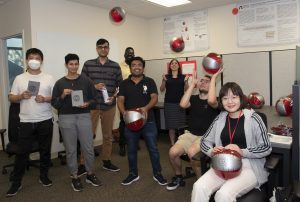
We are excited to welcome students into our new MS in Applied Mathematics and MS in Computer Science programs at Ramapo College! They join our MS in Data Science students as members of our DMC community. All of these new programs are taught by our dedicated full-time faculty. We had a chance to meet them on Thursday, September 8th at the DMC Meet-and-Greet. We are so happy you chose to continue your education with us!
Categories: Uncategorized
August 25, 2022Ramapo College’s Master of Data Science Program Recognized by ‘Fortune’ among the Best in the Country
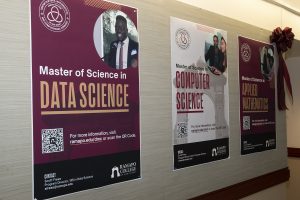
Ramapo College of New Jersey’s Master of Science in Data Science (MSDS) program has been determined by Fortune to be among the top programs in the country. Ramapo’s program is also the only New Jersey program to be included in Fortune’s first-ever ranking list of 28 graduate-level data science programs nationwide.
Categories: Data Science, MSDS
July 2, 2022DMC Advisory Board Member - Keith Osani
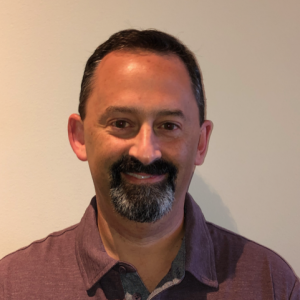
Ramapo College’s Center for Data, Mathematical, and Computational Sciences welcomes Keith Osani to our Advisory Board! Our Advisory Board’s mission is to assist the Center in aligning our curriculum with industry needs and expectations, helping us to promote our curriculum, and guide us in developing our sponsored fieldwork experiences to our students.
Keith earned a BS in Computer Science and Applied Physics from SUNY Albany and graduated from Ramapo College in 2022 with a Master’s Degree in Data Science. The
early part of his career was spent working as a consultant where he focused on custom software and web development for a variety of clients. For the last 20 years, Keith has worked in the music industry for Sony Music Group. Over the years with Sony, he has had the opportunity to work in royalties, digital supply chain and most recently data reporting and analytics. He is currently the Vice President of Data and Analytics in the Global Technology group. In this role, Keith leads a data engineering team responsible for the collection and storage of vast amounts of streaming consumption data reported by providers such as Spotify, Apple Music and Amazon. His team is also responsible for supporting Sony’s global community of analysts.
Categories: Data Science, MSCS, MSDS
April 15, 2022Grand Opening of the Center for Data, Mathematical, and Computational Sciences

Wednesday, April 27th at 6pm
ASB 123
Join us in opening the new Center for Data, Mathematical, and Computational Sciences. This research space serves as a place for graduate students and students in 4+1 programs to work in groups, deliver presentations, and hold team meetings. It’s a great place to hold faculty/student meetings and research discussions, and to invite our external partners to campus.
For more information contact Dr. Amanda Beecher (abeecher@ramapo.edu)
Categories: Data Science, MSCS, MSDS
April 4, 2022Fall 2022 DMC Course Schedule
1st Year Students
Welcome to Ramapo College of New Jersey! Whether you are entering the MS in Data Science, Applied Mathematics, or Computer Science, there are a few things you will want to take care of to get ready for your first semester. Admissions has a guide for admitted students, which outlines the registration process and a number of other things of interest.
Fall 2022 Course Schedule
-
CMPS 547 – Foundations of Computer Science
This course provides a foundational overview of programming language design, including compiled languages as well as higher level scripting languages. The course introduces students to concepts such as grammars, binding, scope, flow control, and data abstraction – through the lense of multiple languages. Students will also gain experience programming across language interfaces. This course serves 3 core purposes as a foundational course for MSCS students: (1) Principles of Programming Languages – this course serves as a general introduction to the theory of computation and programming language design. Topics cover basic theory of computation, and language principles such as context free grammars; binding and scope; static and dynamic semantics; type safety; recursion; concurrency. The theoretical topics covered throughout the course will be demonstrated / mapped to the programming topics languages introduced. (2) The C programming language – students are introduced to the C as a way to prepare them for courses such as Operating Systems and so they understand aspects of low level programming language to support the Computer Architecture course as well. The fundamental topics in C include types, control flow, structures, arrays, pointers, and relationship to hardware via compilation. (3) Python Programming – students will learn how higher level languages differ from C, and how they map to lower level languages. Significant time will be spent covering a variety of language concepts through the lens of Python, culminating with extending Python via C through Cython.
Monday nights – 6:05pm – 7:20pm
Required for MS Computer Science first year students.
Category 2 elective for MS Applied Mathematics students -
MATH 680 – Advanced Mathematical Modeling
This course requires students to develop, use, and assess models to solve real-world problems using the mathematical modeling process. Models developed in a variety of disciplines, including linear programming, network science, decision theory, machine learning, are studied and used to solve problems in other disciplines.
Monday nights – 6:05pm – 7:20pm
Required for MS Data Science second year students.
Required course for MS Applied Mathematics students (any year, with pre-requisites).
Category 2 elective for MS Computer Science students (with pre-requisites).DATA 601 – Introduction to Data Science
This course serves as the foundation for all DATA graduate level coursework. It will cover programming, data analysis, data visualization, ethics and security / privacy concerns surrounding data, and other topics students are expected to master in the program. The course will also feature a Seminar component designed to acclimate students to working with Industry Sponsors and to hear first hand from people working in Data Science.
Tuesday nights – 6:05pm – 7:20pm
Required for MS Data Science first year students.
Category 2 elective for MS Applied Mathematics (recommended for first year students).MATH 570 – Applied Statistics
This course gives an introduction to statistical methods used in data science with an emphasis on applications. Topics may include foundations of probability, univariate and multivariate random variables and distributions, special distributions, Central Limit Theorem, one- and two-sample methods, point estimation, interval estimation, hypothesis testing, regression analysis, Bayesian analysis, data analysis and model building.
Tuesday nights – 8pm – 9:15pm
Required for MS Data Science full time first year students. May be deferred to future semester for part time MSDS students.
Required for MS Applied Mathematics students full time first year students. May be deferred to future semester for part time MSAM students.
Category 2 elective for MS Computer Science students (recommended for first year students).CMPS 530 – Python for Data Science
This course introduces students to fundamental programming concepts and skills utilized by Data Scientists – in particular parallel computing, I/O, and visualization – all through the Python programming language and associated libraries (i.e. numpy, pandas, etc.). The course is suitable for students with a basic knowledge of programming, and prepares students to take more advanced computing courses in databases, big data analytics, machine learning, and other DATA and CMPS electives.
Required for MS Data Science full time first year students. May be deferred to future semester for part time MSDS students.
Category 2 elective for MS Applied Mathematics students (strongly recommended for first year students).
Category 1 elective for MS Computer Science students (recommended for first year students).MATH 562 – Applied Linear Algebra
This course is a foundational course for the study of Linear Algebraic structures used in a variety of scientific and computational applications, such as data fitting, clustering, feature engineering, image processing, machine learning, optimization, and dynamical systems. In order to achieve this purpose, this course will cover topics in linear algebra including vector and matrix operations, linear transformations, linear independence, norms, decomposition, and least squares.
Thursday nights – 8pm – 9:15pm
Category 1 elective for MS Data Science students.
Required for MS Applied Mathematics (strongly recommended for first year students).
Category 2 elective for MS Computer Science students (recommended for first year students).Categories: Uncategorized
March 24, 2022DMC Advisory Board Member - Dobri Yordanov

Ramapo College’s Center for Data, Mathematical, and Computational Sciences welcomes Dobri Yordanov to our Advisory Board! Our Advisory Board’s mission is to assist the Center in aligning our curriculum with industry needs and expectations, helping us to promote our curriculum, and guide us in developing our sponsored fieldwork experiences to our students.
Dobri is a Ramapo ’15 graduate with a BS in Computer Science and Mathematics. He started his career with web and flash freelancing even prior to attending and was a part of developing the infrastructure behind most of the ramapo.edu websites. After graduation, he spent 4 years at Google, working on critical infrastructure on Google Maps, Google Assistant and Daydream (virtual / augmented reality). Facebook was the next prototyping home for him, where he led engineering on a music collaboration experience called Collab as a part of NPE, Facebook’s experiences incubator. Most recently, he’s joined Manticore Games as a principal engineer, leading major efforts to build out the next big thing in game development. Dobri is also an adjunct faculty in computer science at Ramapo, most recently running a course on computer graphics in Unreal Engine 5.
Categories: Uncategorized
March 22, 2022DMC Advisory Board Member - Yoav Nathaniel
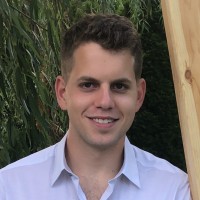
Ramapo College’s Center for Data, Mathematical, and Computational Sciences welcomes Yoav Nathaniel to our Advisory Board! Our Advisory Board’s mission is to assist the Center in aligning our curriculum with industry needs and expectations, helping us to promote our curriculum, and guide us in developing our sponsored fieldwork experiences to our students.
Yoav Nathaniel was born in Israel and grew up in New Jersey, where he attended Ramapo College to study computer science. In 2015, while in school, Yoav joined Avanan, a cloud security startup that was later acquired by CheckPoint, as it’s first employee. Initially focused on QA for Avanan’s product, but later shifted to development, sales, marketing and cloud security thought leadership. Yoav later joined Goldman Sachs and led its firm wide cloud security engineering team, governing the cloud security standards of over 10,000 engineers. In early 2022, Yoav co-founded Silk Security to help security teams accelerate their remediation processes and save hours of work per week.
Categories: Data Science, MSCS, MSDS
March 1, 2022Center for Data, Mathematical, and Computational Sciences Fair
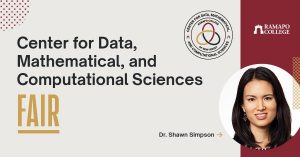
Date/Time: Tuesday, 4/5/22, 5-7pm
Location: Ramapo College, Trustees Pavilion 1Join us for the Data, Mathematical, and Computational Sciences Fair on April 5th, 2022! This event will feature keynote speaker Dr. Shawn Simpson, Principal Data Scientist at BlackRock AI Labs, who will share practical tips gleaned from her career as a Data Scientist in finance, media, and advertising. Following the keynote speech, attendees will have the chance to view posters showcasing Ramapo students’ research projects in Data, Mathematical, and Computational Sciences. Attendees will be able to network with Ramapo students and faculty, as well as prospective employers who may be looking to hire interns or full-time employees. Awards will be given for the best posters.
This event is open to current and prospective students, faculty, staff, and members of the public.
This page will be updated as more information about the event is announced
Schedule
- 5:00-5:05pm Guests arrive
- 5:05pm-5:10pm Welcome remarks (President Cindy Jebb)
- 5:10-5:20pm Welcome and overview of Ramapo’s bachelor and master degree programs in Data, Mathematical, and Computational Sciences (Scott Frees and Amanda Beecher)
- 5:20-6:15pm Keynote speech: “Field notes for future data scientists: tips from a career in industry” by
Dr. Shawn Simpson, Principal Data Scientist, BlackRock AI Labs. See additional information below. - 6:15-7:00pm Student poster session and networking event
Keynote Speaker
Speaker: Dr. Shawn Simpson, Principal Data Scientist, BlackRock AI Labs
Title: Field notes for future data scientists: tips from a career in industry
Abstract: When training to be a data scientist there is an emphasis on data analysis and modeling
techniques — but what happens once you are out in industry? This talk will provide practical suggestions based on my career in data science, with examples drawn from applications in news and media, finance, and advertising technology. Topics will include going deep with data, understanding uncertainty, joining forces with engineers, taking a product mindset, knowing your end user, and architecting end-to-end systems.Speaker bio: Shawn Simpson, Ph.D. is Principal Data Scientist in BlackRock AI Labs, where she leads an initiative that builds AI-powered decision tools for traders. Previously she was Senior Data Scientist at Tapad, a cross-device advertising technology firm. She built large-scale predictive models for telco applications using Scala, Spark/PySpark, Python, Hadoop MapReduce, and Google Cloud Platform technologies, and acted as lead data scientist on cross-functional product teams. Prior to that Shawn was Head of Data Science at Dow Jones. She was responsible for multivariate paywall testing on WSJ.com, predictive models for subscriptions and cancellations, company-wide data science training,
and internal consulting for newsroom, finance, and customer teams.Before joining industry Shawn was an Assistant Professor of Statistics at Columbia University. Her research focused on analysis of recurrent events, Bayesian methods for large-scale data, and post-
marketing drug safety surveillance. She has a Ph.D. in Statistics from Columbia University and a B.S. in Electrical Engineering from the University of Illinois at Urbana-Champaign.Categories: Uncategorized
February 15, 2022Multifractal Analysis of Daily US COVID-19 Cases
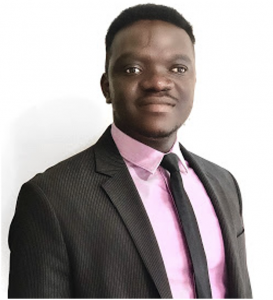
Wednesday, March 23rd at 6-7pm in ASB 323
In this talk we discuss how the multifractal detrended fluctuation analysis (MFDFA) technique can be used to explore the highly irregular behavior or volatility clustering of daily COVID-19 cases in the United States. By using the multifractal spectrum of the MFDFA we will characterize the path and predict the short or long memory behavior of the US COVID-19 Cases on different time scales.
Biography: Osei Tweneboah is Assistant Professor of Data Science at Ramapo College of New Jersey. His main research is Stochastic Analysis, Machine Learning and Scientific Computing with applications to Big Data and Complex Data sets arising in Finance, Public Health, Geophysics, and others. Dr. Tweneboah is co-author of the textbook Data Science in Theory and Practice: Techniques for Big Data Analytics and Complex Data Sets recently published by Wiley.
Categories: Data Science, Lecture Series, MSDS
Copyright ©2025 Ramapo College Of New Jersey. Statements And Policies. Contact Webmaster.
